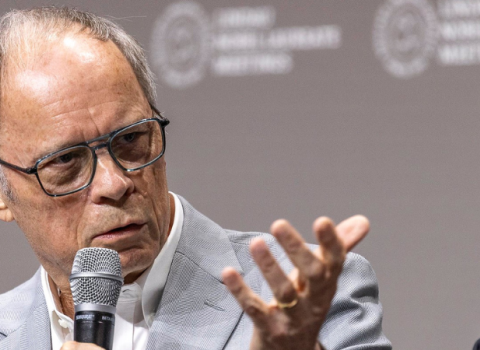- Sustainable delivery initiatives to reduce number of vehicles in Dublin
- Student internships and programmes to generate ideas for the future
- Up to 720 delivery stops a day in central Dublin now completed with alternative fuel vehicles, reducing last mile CO2 emissions by up to 45%
UPS, a global leader in logistics, and the University of Dublin, Trinity College Dublin today announced a five-year partnership to drive sustainable solutions for Dublin.
“UPS is committed to addressing the environmental challenges facing the logistics sector by partnering with influential organisations,” said Andy Smith, UPS Ireland Country Manager. “This collaboration with Trinity College Dublin will help us deliver a more sustainable future for Dublin, reducing carbon emissions on campus and in the city, while inspiring students to develop ideas that will benefit the local community for years to come.”
The new partnership sees the launch of two initiatives at Trinity’s campus in the city centre. A UPS ‘urban eco package hub’ will act as a mini distribution centre for parcel deliveries, which are now distributed on foot and via UPS electrically-assisted cargo cycles. Meanwhile, Trinity students and staff can collect their online shopping parcels on campus any time of day or night thanks to newly installed lockers operated by Parcel Motel, a UPS company.
“Trinity’s steadfast commitment to sustainability is driven by both staff and students, from research and education programmes to practical campus initiatives,” said Dr Patrick Prendergast, Provost of Trinity College Dublin. “This partnership with UPS will benefit the college community, both with the installation of the new parcel delivery solutions on campus and for students to participate in valuable internship and employment opportunities at UPS.”
The introduction of the on-campus urban eco package hub complements UPS’s existing eco package hub on Wolfe Tone Street operating since 2017, and allows the company to make up to 720 delivery stops a day via more environmentally-friendly vehicles in Dublin. Through these hubs UPS has eliminated the use of five diesel delivery vehicles in the city centre, easing congestion and reducing CO2 emissions by up to 45%.
UPS has developed these ‘last mile’ delivery solutions in response to the rise in ecommerce, which has led to an increase in residential delivery stops, causing challenges in busy urban cities.
Under the new partnership, Trinity students will also have the opportunity to participate in UPS internships and graduate programmes at any one of its European locations, along with a range of sustainability workshops and projects being developed by the organisations to generate sustainable ideas for the future.
Trinity College Dublin ranks tenth globally in the 2019 Times Higher Education Ranking for the UN Sustainable Development Goal of Climate Action. The first Irish university to join the International Sustainable Campus Network, it launched Ireland’s first deposit-return coffee cup scheme this year in collaboration with Dublin City Council and Dublin City University.
Since 2009, UPS has invested more than $1 billion in alternative fuel and advanced technology vehicles and fuelling stations globally. In 2016, UPS achieved its self-set goal of covering a billion miles (1.6bn km) using its fleet of alternative fuel and advanced technology vehicles, a year earlier than expected. Today, these UPS vehicles drive more than 1 million cleaner miles (1.6m km) per day. UPS aims that in 2020 one in every four new vehicles it purchases globally will be an alternative fuel or advanced technology vehicle.
This communication was first published 13 January 2020 by Trinity College Dublin.





 A unique international forum for public research organisations and companies to connect their external engagement with strategic interests around their R&D system.
A unique international forum for public research organisations and companies to connect their external engagement with strategic interests around their R&D system.